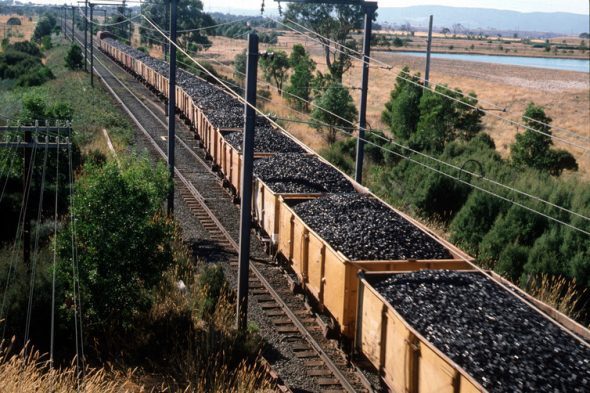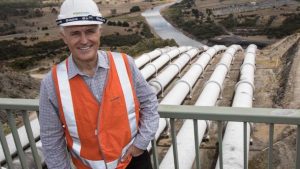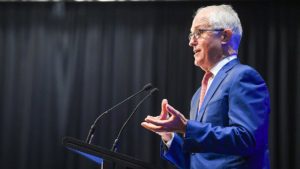Australia’s Prime Minister Malcolm Turnbull will have some explaining to do when he attends the Pacific Islands Forum leaders’ meeting in Pohnpei, Micronesia, this week.
Australia’s continued determination to dig up coal, while refusing to dig deep to tackle climate change, has put it increasingly at odds with world opinion. Nowhere is this more evident than when Australian politicians meet with their Pacific island counterparts.
It is widely acknowledged that Pacific island states are at the front line of climate change. It is perhaps less well known that, for a quarter of a century, Australia has attempted to undermine their demands in climate negotiations at the United Nations.
The Pacific Islands Forum (PIF) – organised around an annual meeting between island leaders and their counterparts from Australia and New Zealand – is the Pacific region’s premier political forum. But island nations have been denied the chance to use it to press hard for their shared climate goals, because Australia has used the PIF to weaken the regional declarations put forward by Pacific nations at each key milestone in the global climate negotiation process.
In the run-up to the 1997 UN Kyoto climate summit, Pacific island leaders lobbied internationally for new binding targets to reduce emissions. However, that year’s PIF leaders’ statement was toned down, simply calling for “recognition of climate change impacts”.
Likewise, in the lead-up to the 2009 Copenhagen talks, Pacific island countries called for states to reduce emissions by 95% by 2050. But at that year’s PIF meeting in Cairns, the then prime minister, Kevin Rudd, convinced leaders to scale back the proposed target to 50%. Pacific media branded the outcome “a death warrant for Pacific Islanders”.
Ahead of last year’s Paris summit, Australia again exercised its “veto power” over Pacific climate diplomacy. Over the preceding years Pacific island leaders had made their climate positions quite clear, both at UN discussions in New York and in a string of declarations including the Melanesian Spearhead Group Declaration on the Environment and Climate Change, the Polynesian Leaders’ Declaration on Climate Change, and the Suva Declaration on Climate Change.
Nevertheless, the official climate declaration issued after last year’s PIF in Port Moresby was significantly weaker in several key areas. Most notably, it failed to call for global negotiations to limit global warming to 1.5℃ above pre-industrial levels. This is a threshold that Pacific island states have consistently argued should not be crossed, because that would threaten the very existence of low-lying states such as Kiribati, Tuvalu and the Marshall Islands.
These countries are understandably very unwilling to compromise on this position. At the Port Moresby meeting, Kiribati President Anote Tong suggested that Australia should leave the forum altogether if it was not prepared to back the islands’ positions in global climate negotiations.
There is little doubt that Australian attempts to gag its Pacific island neighbours in these negotiations have aroused anger in the region. This has been compounded by the fact that Australians are among the world’s highest per capita greenhouse gas emitters and the Australian government is committed to increasing exports of the dirtiest source of emissions – coal.
Pacific perspectives on Australia’s coal addiction
If Pacific islands are to avoid the most catastrophic impacts of climate change, there is little doubt that most of the world’s coal must stay in the ground. No serious policymaker disputes the basic fact that our carbon budget is severely limited. There is no scenario in which building new coal mines, and expanding existing ones, is compatible with effectively tackling climate change.
Pacific island governments are calling for a global move away from coal. In September 2015, the Pacific Islands Development Forum (a new regional body that meets without Australian representation) called for an urgent international moratorium on the development and expansion of fossil-fuel-extracting industries, particularly new coal mines.
Leaders from the Cook Islands, Kiribati, Marshall Islands, Nauru, Niue, Palau and Tuvalu issued a similar statement on the sidelines of the Port Moresby summit. President Tong wrote personally to world leadersbefore the Paris talks, asking them to support the moratorium.
Australia’s view could scarcely be more different. It is the world’s largest coal exporter, and both major political parties are financially backed by the coal lobby. Rather than move away from coal, the government is seeking to expand exports dramatically, with public subsidies and taxpayer-funded infrastructure.

These exports are still largely shielded from discussions about Australia’s contribution to climate change. Because Australian coal is burned in China, Japan and elsewhere, the emissions are ascribed to those nations.
In 2016 Australia will export around 1 billion tonnes of carbon dioxide emissions, embodied in coal. By some estimates, over the next five years Australia’s “carbon exports” will overtake those from Saudi oil.
Australia’s coal addiction has implications for its relations with Pacific island neighbours. For a start, it has undermined any claim that decisions made at the Pacific Islands Forum represent the “true” Pacific voice on climate change.
The ramifications may go deeper still. While Pacific leaders still accept the need to meet with their wealthier and more powerful neighbour – Australia is a crucial partner in times of natural disaster and a key source of development aid – joint decisions made at the PIF are beginning to ring hollow. Island states are increasingly using other multilateral forums to pursue their interests.
Pacific leadership and global climate diplomacy
To be sure, Pacific island states have long pursued independent diplomatic strategies to tackle the root causes of climate change. The first UN proposal for multilateral climate action – which later became the Kyoto Protocol – was proposed in 1994 by Pacific diplomats working through the auspices of the Alliance of Small Island States (AOSIS).
Twenty-one years later, Pacific leaders were again crucial in securing the Paris Agreement, the first truly global agreement for tackling climate change. Last week US President Barack Obama told Pacific island leaders in Hawaii that agreement would have been impossible “without the incredible efforts and hard work of the island nations”.
Pacific island states have been able to exercise global climate leadership despite Australia’s efforts. How Pacific island countries pursued recent climate diplomacy is instructive. In the lead-up to the Paris talks, Pacific ambassadors to New York met regularly as the Pacific Small Island Developing States (P-SIDS) grouping, where previously they were more likely to meet under the auspices of the PIF.
Last year, the P-SIDS ambassadors wrote a “zero draft” of a Pacific island declaration on the global climate change negotiations, which ultimately became the strongly worded Suva Declaration on Climate Change. It had been finalised at the 2015 Pacific Islands Development Forum leaders’ meeting and released just days before the watered-down Port Moresby statement. Unsurprisingly, Pacific states pursued the Suva position once they arrived in Paris.
These tactics proved crucial to the advancement of Pacific islands’ position in the global climate talks. But Pacific states also acted on their own. Remarkably, the Marshall Islands was almost single-handedly responsible for the successful negotiation of an ambitious Paris Agreement.
Six months before the December Paris conference, the Marshall Islands government convened a series of private meetings that paved the way for the formation of a “high-ambition coalition” of climate-progressive states. By the second week of the summit, this group had swelled to include the United States, the European Union and more than 100 other countries. This coalition ultimately had a crucial say in formalising the agreement’s 1.5℃ goal.

In the months before the Paris talks, Australia was not invited to join the high-ambition coalition. It attempted to join right at the summit’s tail end, but was later snubbed by coalition members at the Paris deal’s signing ceremony in New York in April.
There seems little doubt that Australia was left out in the diplomatic cold precisely because its climate “ambitions” are so dismally low. Indeed, when Australia announced its intended emissions targets for the Paris Agreement, the Marshall Islands’ foreign minister, Tony de Brum, complained that if the rest of the world followed Australia’s lead, his country, and other vulnerable nations on Australia’s doorstep, would disappear.
The contrast could not be starker. While Pacific leaders are praised for their efforts to develop global climate solutions, Australia faces ignominy. Unless Australia changes direction, it will continue to be seen as an irresponsible middle power – a rogue state undermining global efforts to tackle climate change.
Australian governments will also find it increasingly hard to convince Pacific island countries they are a friend as well as a neighbour.
Source: The Conversation. Reproduced with permission.










